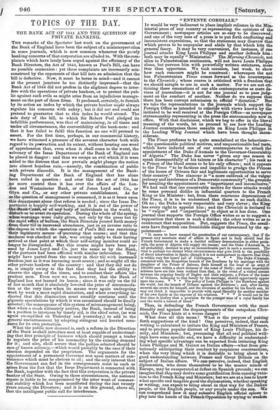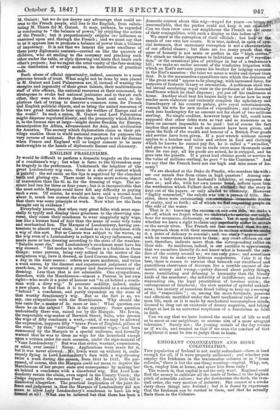" ENTENTE CORDIALE."
IT would be very indiscreet to place implicit reliance in the Min- isterial press of any country as representing the opinions of the Government ; newspaper articles are so easy to be disavowed; and one of the very uses of a press is to put forth conflicting and inconsistent expressions, so that the statesman may disavow that which proves to be unpopular end abide by that which hits the general fancy. It may be very convenient, for instance, if one journal attacks King Louis Philippe and another defends him : both may be equally " Ministerial." The Morning Chronicle, not alien to Palmerstonian sentiments, will not leave Louis Philippe alone, but pursues him with powerfully written strictures, more true than opportune. We took occasion, last week, to show how such rancours might be construed : whereupon the not less Palmerstonian Times comes forward as the counterpoise to the Chronicle ; whose course is criticized with a freedom that we should scruple to use in such a matter. For we are not cri- ticizing these emanations of our able contemporaries as mere de- vices of journalism—it is not for one journal so to pass judg- ment on the conduct of another. Neither do we suppose that there has been corrupt submission to official " dictation. ' But we take the representations in thejournals which support the Foreign Office as intended to coincide with views known by the initiated to be well received at the Foreign Office—as newspaper statesmanship representing in the press the statesmanship now in office. With that disclaimer, which we beg to offer in the literal meaning of the words, let us proceed to see how the Leading. Journal counterpoises those assaults on King Louis Philippe in the Leading Whig Journal which have been thought incon- siderate.
The Times professes to be quite scandalized at the behaviour- " the questionable political motives, and unquestionable bad taste, which have induced one of our contemporaries to attack the appointment of the Duke d'Aumale to the Governor-Generalship of Algeria." The Duke has never "given any one reason to speak disrespectfully of his talents or his character" ; his rank as a Prince of the blood seems to be his only offence ; and it appears to the Times " to be factious and impolitic to grudge the Princes of the house of Orleans fair and legitimate opportunities to serve their country." The clamour is "a mere outbreak of the vulgar jealousy and intolerance of a Democratic community"; the grounds for assailing the appointment are " impertinent and inconclusive." We had said that one conceivable motive for these attacks would be some personal dislike in influential quarters to the French King or his Minister : but, from these courteous deprecations of the Times, it is to be understood that there is no such dislike. Oh no ; the Duke is very respectable and very clever •, the King has every right to appoint him ; and the Chronicle is declared to be " vulgar" and impertinent" to object as it has done. One journal that supports the Foreign Office writes so as to suggest a supposition that there is such a dislike; the other writes so as to counteract that supposition. But, suggests the Times, the assail- ants have forgotten one formidable danger threatened by the ap- pointment— " It seems to have escaped the penetration of our contemporary, that if the present very uncertain state of affairs in Spain and in Italy should lead the
French Government to make a decided military demonstration in either penin- sula, the army of Algeria will supply the means; and the Duke d'Aumale is, in all probability, destined to play no inconsiderable part in such a movement. The time is perhaps too distant when circumstances may give birth to the possibility of direct intervention in Spain; though it is not unimportant to observe that Oran is within very few hours' sail of Carthagena. • • • The Duke d'Aumals, connected with the Neapolitan branch of the Bourbons by his marriage with the daughter of the Prince of Salerno, finds himself at the head of an army of 100,000 men within a short distance of the coast of Sicily; and more improbable schemes have ere this been realized than that, in the event of a violent contest between the reigning family of Naples and their subjects, a Prince of the house of Orleans, belonging to that family by his marriage, should opportunely appear upon the scene. • • * The policy of Louis Philippe is the Bourbons against the world, but the branch of Orleans against the Bourbons '; and, after having secured one crown for himself, and the reversion of another for his fourth son, he may not think it impossible to provide with equal liberality for another member of his own family at the expense of his relations. • • * It would not be the first time in history that a provision for the younger sons of a royal family has cost the world a torrent of blood."
Thus, in defending the French Government with the most friendly zeal against the disparagements of the outspoken Chro- nicle, the Times hints at a worse danger
What does all this mean ? What is the purpose of putting forth suggestions of the kind ? One perceives, indeed, that such writing is calculated to irritate the King and Ministers of France, and to produce popular distrust of King Louis Philippe, his fa- mily, and Ministers ; but, presuming that all real political writ- ings have some specific end, we have a difficulty in understand- ing what specific advantage can be expected from irritating King Louis Philippe and M. Guizot on Italian affairs—what from gra- tuitously anticipating their conduct by suspicious constructions, when the very thing which it is desirable to bring about is a good understanding between France and Great Britain on the subject of Italian affairs. We can perceive, indeed, that English diplomatists, who deem themselves to be the master minds of Europe, may be exasperated at defeat on Spanish grounds; we can
imagine that they may derive some gratification from causing vexa-
tion to the French King and Ministers; but we are at a loss to know what specific and tangible good the diplomatists, whether speaking
or writing, can expect to bring about in that way for the Italian people, or the English people, or any people under the sun. W.e can comprehend how it may subserve English official spleen to play into the hands of the French Opposition by trying to weaken
M. Guizot; but we do not descry any advantage that could ae- crue to the French people, still less to the English, from substi- tuting M. Thiess for M. Guizot. It may, perhaps, be regarded as conducing to " the balance of power," by crippling the action of the French ; but it proportionately cripples our influence as exercised upon and through the French ; and we must say that to us it appears less to promote a balance of power than a balance of impotency. It is not that we lament the mere smallness of these petty diplomatic contests—carried on like the quarrels of children, who sit smiling to the company and pinching each other under the table, or slyly throwing out hints that baulk each other's projects ; but we regret the utter vanity of the fuss-making —its destitution of worthy motives, its destitution of practical ends.
Such abuse of official opportunity, indeed, amounts to a most grievous breach of trust. What might not be done by men placed as M. Guizot and Lord Palmerston are, if, instead of wasting the energies and ingenuity of their great talents, their multitudinous staff of able officers, the national resources at their command, in stratagems to evoke bad national jealousies and to thwart each other, they were to devote themselves, heart and soul, to the glorious task of trying to discover a common term for French and English political objects, and so bring the united resources of the two great nations to bear upon the welfare of Europe and of the world ! In such a union, M. Guizot and Lord Palmerston might dispense regulated liberty, and the prosperity which follows it, to the human race at large—might decree freedom for Europe, emancipation for Africa, advancement for Asia, and civilization for America. The secrecy which diplomatists claim as their pri- vilege enables them to wield national resources for purposes the very reverse of national. But the time perhaps is not far distant when France and England will no longer consent to be mere makeweights in the bands of diplomatic finesse and chicanery.



























 Previous page
Previous page